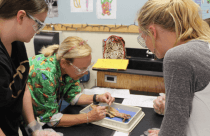Ways to Mentor the Next Generation of Scientific Researchers

The world is changing fast and we communicate even faster. The new generation of students are used to a system in which information circulates constantly through new media that allows them to participate and be proactive. They are used to reacting fast, motivated by a society that is constantly changing. How do you mentor this new generation of scientific researchers?
A good mentor has accomplished his tasks when a trainee has become an independent researcher, able to succeed in the academic world on his own. He should share knowledge and skills, and give personal support when the trainee faces problems inside and outside Academia. To mentor someone is a difficult task but not everyone has the ability to do so. Nowadays, age differences between senior and younger researchers can increase this difficulty.
Supervisors may help researchers to grow, both academically and personally. After all, their goal is to help them become professionals who can survive in the academic industry.
Academic Support
A good mentor should help in a personalized way. Nowadays, researchers have access to all kinds of information, both in libraries and through the Internet. Therefore, supervisors should be able to provide researchers with something special and unique—something that makes them feel that spending time with their mentor helps more than spending the same amount of time trying to find solutions on the Internet.
Besides, in order to boost the intellectual development of researchers, mentors should encourage them to be proactive and independent—not only to inspire them, solve their doubts, and help them to move forward but also to give them the freedom to make their own choices and to grow.
Personal Guidance
Network is important. Therefore, mentors should help researchers promote relationships with the professional and academic community and provide guidance on career options and job opportunities. A mentor should be the one who teaches how to behave in the academic world, face the problems, deal with superiors, and consider important professional decisions. And that starts with communication—a mentor should be able to listen to the researcher’s concerns carefully and with respectful attitude.
The mentor or supervisor must be able to see the world from the student’s perspective. Understand the decision he would like to take regarding his career. Mentors should be sympathetic and understand the researchers’ needs. After all, they are professionals capable of making their own choices, and when it comes to personal decisions, the right to make their own mistakes.









